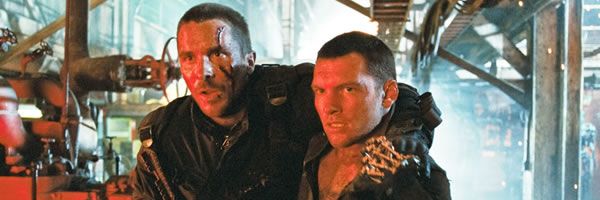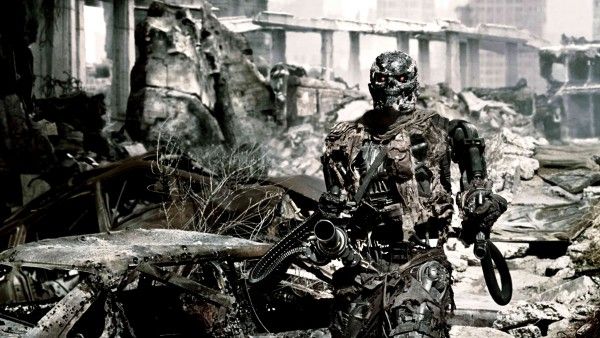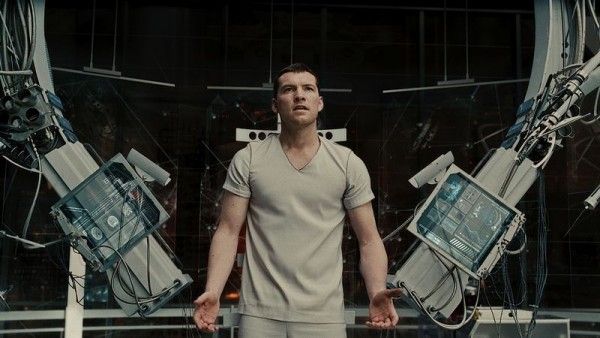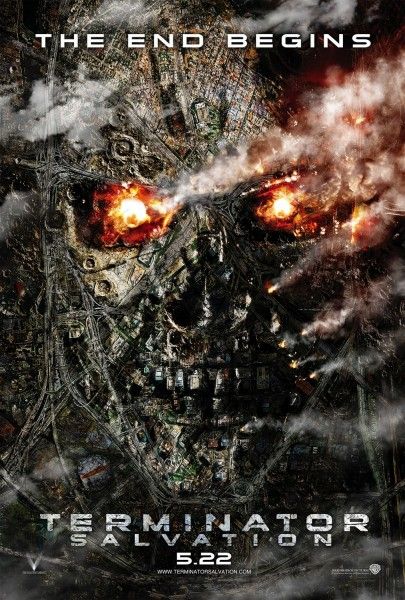Terminator 3: Rise of the Machines showed that a Terminator universe without James Cameron was its own kind of wasteland. Schwarzenegger wasn’t enough, and retreading the same premise as T2—T-800 comes back in time to protect John Connor from a more advanced Terminator—made the third installment mostly pointless. The only part of that movie that significantly moved anything forward was the ending, and we already knew where that ending would take us.
Terminator Salvation wasn’t so much a salvation for the franchise, but a salvage operation. Director McG went for the reality that the first three movies had tried to avoid, and while Salvation removes all hope from the previous installments, it also theoretically could have carved its own path. It’s set in the future; it doesn’t have Arnold Schwarzenegger (the crummy body double and digital masking doesn’t count); and it introduces us to the larger world of Skynet. Conceptually, it’s a very strong movie.
In execution, it’s a chore. The script development for Terminator Salvation is more interesting than the movie, but the key take away from that article is that while the original script was no great shakes, the killer blow was shoehorning in John Connor (Christian Bale) at the expense of Marcus Wright (Sam Worthington) so that neither character makes much of a difference. It’s a dry action movie where a lot of set pieces happen and the characters are mostly ineffective and insignificant.
The movie fumbles from the start where we know more about Marcus than he does about himself, so we’re waiting for him to learn he’s a terminator. All the prologue really tells us is that Marcus did something bad and he’s signing his body over to science. When he emerges from the crater left by the machines (who I guess were precise enough in their detonation to avoid hitting the terminator they needed), we know he’s not human. The particulars may be unclear, and I suppose there’s the mystery of “Why does he not know he’s a Terminator,” but it’s a slog to get to that point, and that’s because John Connor is in the way.
That’s an odd problem for a movie to have: “How do we get our movie star and main character to organically fit into the plot?” and it’s a problem the film never really solves. Although the first three movies have more than their fair share of action, there are moments to pause and consider what role saviors have in this upcoming war. Salvation doesn’t take much time to consider anything. Even though Connor listens to his mother’s tapes and the opening titles tell us that some consider him to be a “false prophet”, Connor now fully believes he’s humanity’s savior, but that doesn’t really come with any extra, psychological baggage.
For Terminator Salvation, being John Connor means being a really good soldier and being the only person in a worldwide resistance who gives fireside chats. While I understand and almost admire that Connor no longer struggles with his destiny, the plot doesn’t do much to delve into his acceptance. Instead, we’re stuck with The Exciting Adventures of John Connor Testing out Software.
Even with Connor’s attention to detail, he stumbles ass backwards into saving humanity by trying to save himself. When we learn that the signal is a trap, the only reason people survive is because John Connor told them not to attack. And he didn’t issue this command because he figured out that the signal was a ruse; he did it because he wanted to make sure his future/past dad, Kyle Reese (Anton Yelchin), didn’t die. John Connor isn’t a brilliant strategist; he just lucked out that his personal preservation also meant humanity’s. Instead of showing how John Connor is special, Salvation doubles down on the first three movies’ promises of “He just is.”
On the other side, you have Marcus, who would be the true protagonist (and was originally intended to be) if not for John Connor futzing about. Perhaps a more charismatic actor could have done more with the role than Worthington, but he would still be stuck on an odyssey to meet other, more interesting characters like Reese. Marcus functions more as an action figure—he moves along as an audience surrogate and then participates in the many set pieces even though, as the reincarnation of a death row inmate, he’s remarkably adept at combat survival situations.
This ultimately leads to the revelation that he’s an “infiltration” unit, and that’s where a plot that was already cracked falls apart completely. Skynet really can’t get over its John Connor fixation, and so their plan is as follows:
- Make Terminator who doesn’t know he’s a Terminator from a guilt-ridden death row inmate.
- Hope terminator infiltration unit survives the many explosions he encounters.
- Capture Kyle Reese, but make sure infiltration unit gets away.
- Have infiltration unit find, but not kill John Connor.
- Hope that John Connor and John Connor’s men don’t kill infiltration unit.
- Get infiltration unit—a cyborg that represents Connor’s hatred for the machines—to convince Connor to come to the Skynet facility and put every other attack on hold.
- Have another Terminator kill John Connor when John Connor gets to the facility.
- Win war. Party down.
If Skynet knows John Connor is important, then it also has to know that Kyle Reese is important. If so, wouldn’t an easier plan be:
- Make Terminator who doesn’t know he’s a Terminator from a guilt-ridden death row inmate.
- If Terminator meets up with Kyle Reese before John Connor, kill Kyle Reese.
- Win war. Party down.
If you kill Kyle Reese, you kill the man who was going to go back in time to protect Sarah Connor and father John Connor. It’s the shortest distance between two points.
That yawning chasm comes from a script that clearly went through the wringer to go from “bad” to “bad in a different way”, which is a shame because the core concepts are sound. I’m no fan of McG, but I like that he tried to flesh out the post-apocalypse that had been talked about for three movies. Sadly, most of it’s fairly generic, but reverse-engineering different Terminator types was neat even if the eel-looking one looks like a reject from The Matrix. Pair that with the future setting and having a self-aware Terminator as the protagonist, and somewhere buried beneath Salvation there’s a good movie that would be worth seeing, especially if it had been ballsy enough to go with the ending that John Connor is really Marcus Wright (that wouldn’t work in the final film, but at some draft along the way, I like the concept that the guy saving humanity is the one who wasn’t “destined” to do so; if you negate avoiding Judgment Day, you may as well do away this destiny stuff and go with the concept that humanity’s salvation is a cyborg).
Instead, Terminator Salvation shrugged itself away into nothingness. It really could have been a fresh start for the franchise and taken some bold chances along the way. Instead, a movie that’s a constant reminder of missed opportunities. After the movie restores the status quo (absolutely nothing in the world has changed except Marcus’ death helped humanity through valuable organ donation), it tries to end on a promise and our good will towards the earlier movies by having John Connor say, “There is no fate, but what we make.” Terminator Salvation made nothing.
Tomorrow: My review of Terminator Genisys
Other Entries:







